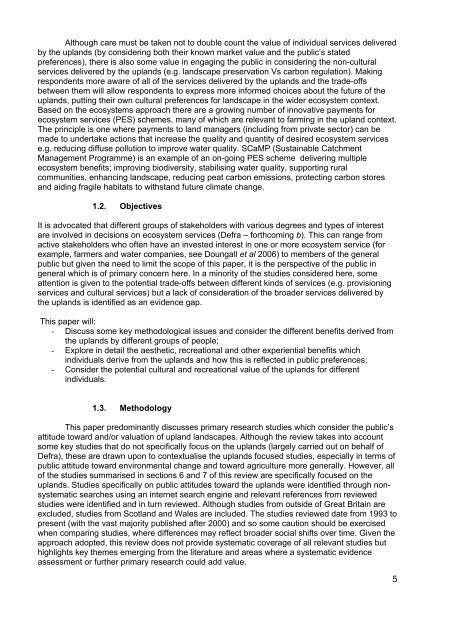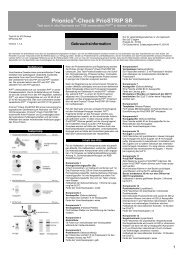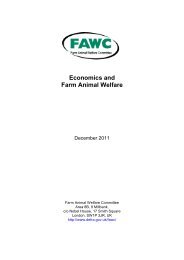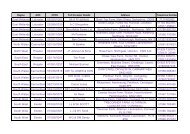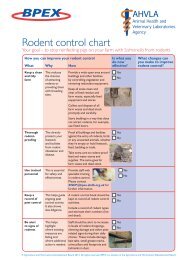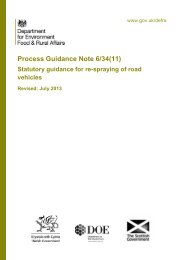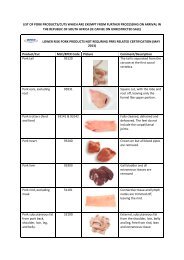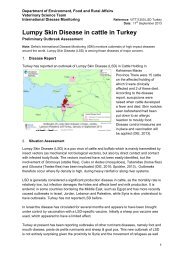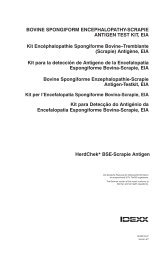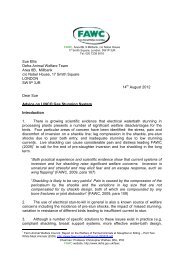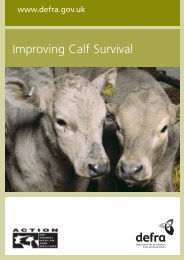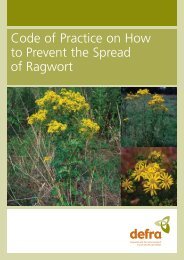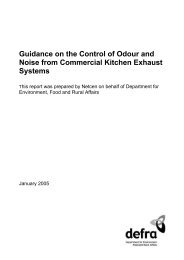Public Attitudes and Preferences for Upland Landscapes - Defra
Public Attitudes and Preferences for Upland Landscapes - Defra
Public Attitudes and Preferences for Upland Landscapes - Defra
Create successful ePaper yourself
Turn your PDF publications into a flip-book with our unique Google optimized e-Paper software.
Although care must be taken not to double count the value of individual services delivered<br />
by the upl<strong>and</strong>s (by considering both their known market value <strong>and</strong> the public’s stated<br />
preferences), there is also some value in engaging the public in considering the non-cultural<br />
services delivered by the upl<strong>and</strong>s (e.g. l<strong>and</strong>scape preservation Vs carbon regulation). Making<br />
respondents more aware of all of the services delivered by the upl<strong>and</strong>s <strong>and</strong> the trade-offs<br />
between them will allow respondents to express more in<strong>for</strong>med choices about the future of the<br />
upl<strong>and</strong>s, putting their own cultural preferences <strong>for</strong> l<strong>and</strong>scape in the wider ecosystem context.<br />
Based on the ecosystems approach there are a growing number of innovative payments <strong>for</strong><br />
ecosystem services (PES) schemes, many of which are relevant to farming in the upl<strong>and</strong> context.<br />
The principle is one where payments to l<strong>and</strong> managers (including from private sector) can be<br />
made to undertake actions that increase the quality <strong>and</strong> quantity of desired ecosystem services<br />
e.g. reducing diffuse pollution to improve water quality. SCaMP (Sustainable Catchment<br />
Management Programme) is an example of an on-going PES scheme delivering multiple<br />
ecosystem benefits; improving biodiversity, stabilising water quality, supporting rural<br />
communities, enhancing l<strong>and</strong>scape, reducing peat carbon emissions, protecting carbon stores<br />
<strong>and</strong> aiding fragile habitats to withst<strong>and</strong> future climate change.<br />
1.2. Objectives<br />
It is advocated that different groups of stakeholders with various degrees <strong>and</strong> types of interest<br />
are involved in decisions on ecosystem services (<strong>Defra</strong> – <strong>for</strong>thcoming b). This can range from<br />
active stakeholders who often have an invested interest in one or more ecosystem service (<strong>for</strong><br />
example, farmers <strong>and</strong> water companies, see Doungall et al 2006) to members of the general<br />
public but given the need to limit the scope of this paper, it is the perspective of the public in<br />
general which is of primary concern here. In a minority of the studies considered here, some<br />
attention is given to the potential trade-offs between different kinds of services (e.g. provisioning<br />
services <strong>and</strong> cultural services) but a lack of consideration of the broader services delivered by<br />
the upl<strong>and</strong>s is identified as an evidence gap.<br />
This paper will:<br />
- Discuss some key methodological issues <strong>and</strong> consider the different benefits derived from<br />
the upl<strong>and</strong>s by different groups of people;<br />
- Explore in detail the aesthetic, recreational <strong>and</strong> other experiential benefits which<br />
individuals derive from the upl<strong>and</strong>s <strong>and</strong> how this is reflected in public preferences;<br />
- Consider the potential cultural <strong>and</strong> recreational value of the upl<strong>and</strong>s <strong>for</strong> different<br />
individuals.<br />
1.3. Methodology<br />
This paper predominantly discusses primary research studies which consider the public’s<br />
attitude toward <strong>and</strong>/or valuation of upl<strong>and</strong> l<strong>and</strong>scapes. Although the review takes into account<br />
some key studies that do not specifically focus on the upl<strong>and</strong>s (largely carried out on behalf of<br />
<strong>Defra</strong>), these are drawn upon to contextualise the upl<strong>and</strong>s focused studies, especially in terms of<br />
public attitude toward environmental change <strong>and</strong> toward agriculture more generally. However, all<br />
of the studies summarised in sections 6 <strong>and</strong> 7 of this review are specifically focused on the<br />
upl<strong>and</strong>s. Studies specifically on public attitudes toward the upl<strong>and</strong>s were identified through nonsystematic<br />
searches using an internet search engine <strong>and</strong> relevant references from reviewed<br />
studies were identified <strong>and</strong> in turn reviewed. Although studies from outside of Great Britain are<br />
excluded, studies from Scotl<strong>and</strong> <strong>and</strong> Wales are included. The studies reviewed date from 1993 to<br />
present (with the vast majority published after 2000) <strong>and</strong> so some caution should be exercised<br />
when comparing studies, where differences may reflect broader social shifts over time. Given the<br />
approach adopted, this review does not provide systematic coverage of all relevant studies but<br />
highlights key themes emerging from the literature <strong>and</strong> areas where a systematic evidence<br />
assessment or further primary research could add value.<br />
5


